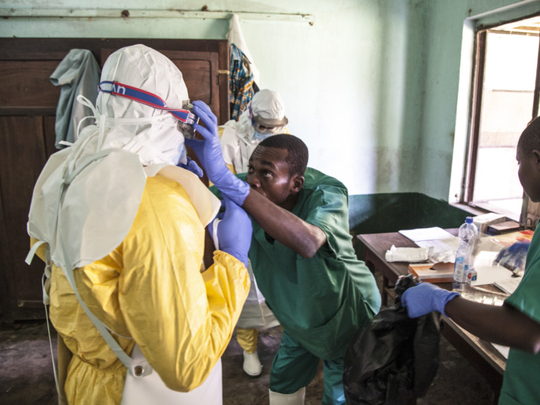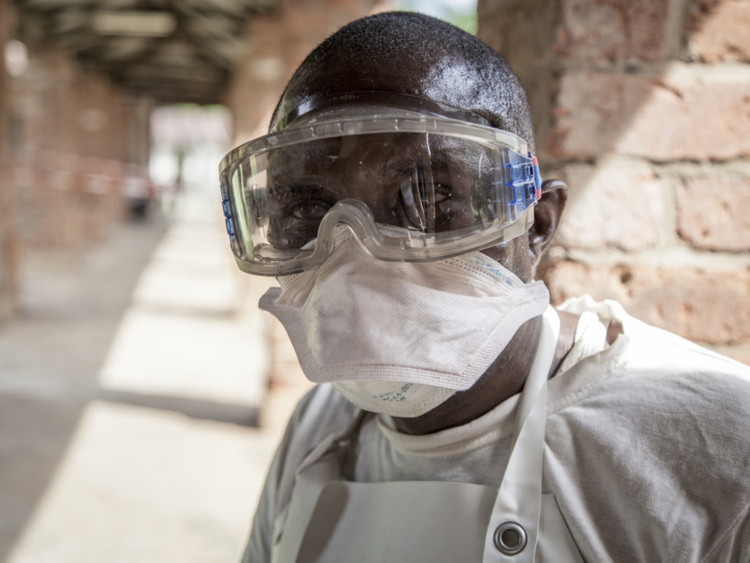
It’s easy to forget how worried people were about Ebola during the outbreak in West Africa four years ago. While most of the 11,000-plus who died of the disease lived in Guinea, Liberia and Sierra Leone, the story dominated headlines and seemingly caused panic the world over.
Americans became particularly irrational about travel. A school in New Jersey, for example, refused to accept two exchange students from Rwanda, which is located more than 2,000 miles (3,218km) from where the outbreak was happening. A teacher from Maine, meanwhile, was placed on leave after visiting Dallas — even though he had been attending a conference miles away from a hospital where two nurses contracted the virus.
The panic subsided far more quickly than the disease. By the time the Ebola outbreak officially ended in January 2016, the world’s attention was focused on a range of other problems. Over the past few days, Ebola has made a (relatively) quiet comeback.
At least 23 people have died in an outbreak declared week before last in the Congo, in which 44 people so far have confirmed, probable or suspected cases. Notably, one of the confirmed cases is in Mbandaka, a city of 1.2 million. As the Post’s Max Bearak reported, an urban case makes things much more complicated — and dangerous. “With the confirmed arrival of the outbreak in a major city, the number of people who are likely to have interacted with infected individuals increases exponentially,” Bearak writes. “Mbandaka’s dense population and the fact that it is a bustling port both heighten the risk of rapid spread.”
Peter Salama, the deputy director general of emergency preparedness and response for the World Health Organisation, also called the urban case a “game changer”. Salama tweeted: “Confirmation of urban #Ebolain #DRCis a game changer in this outbreak — the challenge just got much much tougher.”
The good news is that the world has learnt a lot about how to respond to Ebola since 2014. In his own message, World Health Organisation (WHO) director-general Tedros Adhanom Ghebreyesus sounded an optimistic note. “This is a concerning development, but we now have better tools than ever before to combat Ebola,” he tweeted on Thursday, having visited infected areas in the Congo this week.
Outside experts have praised how quickly health officials have responded so far. The WHO and its partners worked with logistics experts to quickly deploy experts, medical personnel and equipment to the epicentre of the outbreak. “The speed with which they’re doing it and the apparent coordination on a rapid pace seems to be different than in the past,” said Tom Inglesby, director of the Centre for Health Security at the Johns Hopkins Bloomberg School of Health, to Stat News. As Henry Gray, a field coordinator for Medecins Sans Frontieres, said last year when a smaller outbreak in the Congo was quickly contained, “We have all learnt that it’s better to be safe than sorry in order not to repeat the disaster of 2014-2015”.
There’s also cautious optimism surrounding an experimental vaccine being donated by Merck, an American pharmaceutical company, and deployed by Geneva-based Gavi, a non-profit vaccine provider. The vaccine was used in the later stages of the West Africa outbreak, but, according to Mother Jones’ Megan Jula, it will be the first time a vaccine has been used as part of an initial response to an Ebola outbreak. Vaccinations were expected to start as early last weekend, with 4,000 doses already in the country and another 4,000 on the way.
Indeed, the entire reason this vaccine exists is because of the 2014-15 crisis — though the logic behind its development is grim. Potential vaccines for Ebola have existed for years, but few drug developers were interested as they couldn’t make money off them. “There just hasn’t [sic] historically been enough Ebola cases for a private company to make any profit,” said Tom Geisbert, one of the lead researchers on the vaccine, to Mother Jones.
Despite the official optimism, however, there’s plenty of reason to worry. There are logistical hurdles with the vaccine, for example: The Post’s Bearak notes that it must be transported and stored at between minus 60 and ( minus 51 degrees Celsius) minus 80 degrees Fahrenheit, which means powerful refrigerators will need to reach some remote locations. And, as with any experimental vaccine, there will be doubts about its effectiveness.
More broadly, many observers have noted that it’s still far too early to pat anyone on the back or breathe a sigh of relief. Ronald Klain, appointed as the “Ebola Czar” during the administration of former United States president Barack Obama, was among those who voiced concern. “We still don’t know how serious a problem this outbreak will be,” he tweeted last Thursday. Klain tweeted: “This is why I was more cautious than others in hailing the pace/progress of the early response to #EbolaDRC. We still don’t know how serious a problem this outbreak will be, and how quickly key response elements will actually be IN PLACE (not just announced, en route, etc).”
These may seem like duelling messages, but together they sum up the lessons of the West African outbreak. Ebola is unpredictable and shouldn’t be underestimated. At the same time, panicking won’t help things.
So have those lessons been learnt? Certainly some of the international organisations involved have taken them on board. But the global political atmosphere seems to be far less suited to coordinating an effective international response to another large-scale outbreak. Multilateralism, consensus building and sympathy for foreigners in need are necessary — and appear to be in short supply.
If nothing else, the US is now led by a man who spread Ebola panic like few others. “THE UNITED STATES HAS ENOUGH PROBLEMS” US President Donald Trump tweeted on August 1, 2014. Later he followed up with another message that appeared to take aim at American health workers who had worked in West Africa and contracted the disease: “People that go to far away places to help out are great-but must suffer the consequences!” Trump had tweeted “Here we go! I stated long ago that we should cancel all flights from West Africa. Now we have Ebola in US, AND IT WILL ONLY GET WORSE!”
The Obama White House later concluded that these tweets represented a turning point in an American hysteria about Ebola.
It’s not clear whether Trump would take a different tone now, but the United States is probably less prepared for such diseases under his watch: Just this month, the US government scaled back funding for emergency responses to outbreaks overseas. And if Washington is less able to lend a helping hand than it was four years ago, both the United States and Congo will be in greater danger.
— Washington Post
Adam Taylor writes about foreign affairs for Washington Post.










